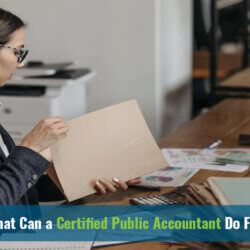Small business accountants and Certified Public Accountants are often thought of as being the same. Although they do perform many of the same tasks and share other similarities as well, they aren’t the same. Read on to find out which one is the best fit for your business.
Small Business Accountants play an important role in the world of small business. They prepare financial statements like income statements, cash statements, and balance sheets. Click here to change this text
Small Business Accountants often perform financial forecasting and financial analysis. They can give advice for potential areas of growth. They prepare, file, and can tend to amendments where taxes are concerned. They also are often in charge of account maintenance and management and help maintain a steady cash flow. Payroll and fixed asset accounting are also among the job descriptions of a Small Business Accountant.
Certified Public Accountants are licensed, which can be important when you are trusting someone to tend to aspects of your business that may include sensitive financial matters. CPAs deal with financial statement analysis, internal and external auditing, tax planning and preparation, and much more. Certified Public Accountants are also helpful in guidance. If you are in the initial stages of starting your business, you may benefit greatly from a CPA who can offer advice on business structure and asset purchasing, and depreciation methodology. The same holds true if you are expanding your small business.
Small Business Bookkeepers also assist small businesses. They are more focused on the micro-management of your finances. They keep track and analyze the details of day-to-day, week-to-week financial management while Small Business Accountants and Certified Public Accountants are mostly concerned with the bigger picture.
Accounting software may or may not save you money. If you don’t know how to use it correctly, it could cost you big bucks in the end. Software may not give you enough support to accurately prepare and file your taxes which again could cost you dearly.
Some find that having accounting software in addition to an accountant or CPA is helpful but doesn’t carry the risks that completely relying on software for all your accounting needs. It is better to be done by a professional like CPA or Accountants.
Knowing what your small business needs are in the financial realm and deciding the best and wisest way to fill those needs can be complicated and confusing. As a rule of thumb, here are the financial professionals and what they specialise in.
You may require a CPA when you:
• Are just starting a new business
• Wish to expand
• Have a complicated tax return & preparation
• You are auditing your firm’s ins and outs
A Small Business Accountant may fill your needs if you:
• Need a little guidance financially
• Need your finances analyzed
• Need help with your taxes that are not overly complicated
You may pay a lower fee and simply hire a Small Business Bookkeeper if:
• You want to track your business spending
• Want to have daily finances analyzed
• Need to keep detailed records of finances
If you are in the market for a Business Tax Preparer, simply search for “business tax preparers near me” and a list will come up. Narrow the results down by checking out each one until you have a few. Give a call and see who you click with. You are sure to find the perfect tax preparer who can save you time, effort, and even money in the long run.











